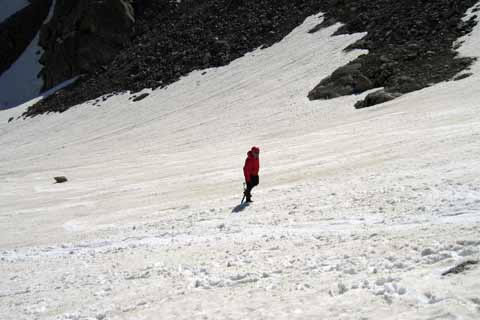| 298 | Hiking Skills - Efficient Movement | 2010-10-25 |

A few years back on a third class (scrambling on rock) group climb, one member of our group was having trouble. He was a fairly experienced hiker and in good shape. He kept falling behind the rest of the group, though. Soon, I was walking with him encouraging him to continue. I could find nothing wrong with him. He was hiking well within his physical limits; but he was very slow because of a strange step. After watching his stride for a while I decided that he was using a modified rest step - I called it a resting step. He was so good at his resting step that I almost fell asleep walking with him. At the next group stop we caught the others. I put the slow walker in the front and convinced him to stop using his resting step. He set a great pace up the rest of the mountain.
Looking back, I think he thought he should be using the rest step, he just really didn't know how to do it. He needed to learn efficient movement.
Being an efficient hiker is learning how to walk further while using less energy. In the 1861 Edward Payson Weston began his exceptional walking career by traveling from Boston to Washington, DC (478 miles) in just ten days. He was a man of efficient movement. He even learned to eat while walking! The man knew how to walk.
Few of us would ever aspire to repeat the exploits of Edward Payson Weston; but being an efficient hiker helps all walkers. There are three categories in efficiency to master. The first, efficient movement we will discuss today. Next week we will talk about efficient systems and efficient planning.
After you have put in some miles and mastered the basic walking techniques of Balance, Pace, Stride, and Rhythm - it is time to learn to move more efficiently. Pay close attention to what your body is saying while you are walking. If you are breathing too hard to carry on a conversation or to sing a song, then make sure you are in Rhythm (hiking rhythm, not singing). Shorten your stride to match your breathing. Don't waste energy. Trying to walk faster than you can breath is like stomping on the accelerator in a car, you might go a short distance faster - but you waste a lot of gas.
Scan ahead ten or fifteen feet on the trail, decide how you are going to maneuver around obstacles long before you get there. Remember not to step on top of an obstacle, instead step over it. And you only need to clear each object by an eighth of an inch. If you pick your feet up higher than the objects height plus an 1/8th of an inch and you are wasting energy.
Lastly practice the famous rest step. The trick to the rest step is that you are taking a mini-break with each step. Take a deep breath and step forward, securely plant your foot. Shift your weight to that leg, exhale, and relax. Repeat as needed!
A few efficient movement hints ...
- Practice reading the trail or terrain. It is a skill and you get better.
- While hiking you do not want to look like those exercise walkers. They are exaggerating their movements to get the best workout. You are trying to conserve.
- When using poles, if I feel like I am wasting energy (generally toward the end of the day) I will just carry the poles in my hand. By holding the poles I still can quickly re-position them for use; but I am not wasting energy placing the poles with every step.
- The rest step is almost natural on steep terrain. It is nearly impossible to do on level terrain.
- When stepping over objects, make sure you give yourself the full 1/8th of an inch. I am still recovering from miscalculating a height a few weeks ago!
- Put in the mileage. Practice.
Mileage, balance, pace, stride, rhythm, and efficient movement all help you become a better hiker. Even walking with efficient movement you still might not be able to break any of Edward Payson Weston's records; but it will help you make it to camp! Next week we will continue the series of Hiking Skills - Efficient Systems.
Happy Edward Payson Weston trails.
